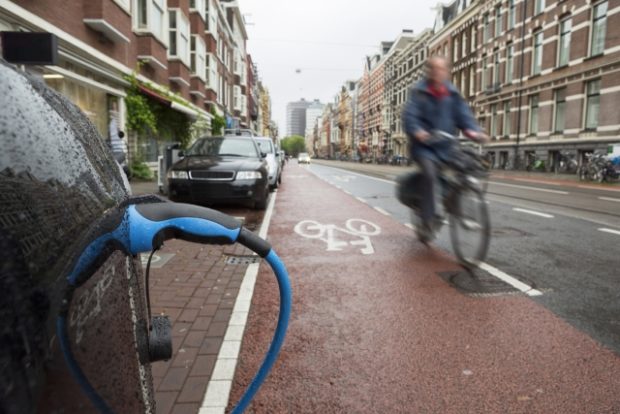Clean air advocate, educator urging gov’t to incentivize EVs for Filipinos

File photo of an electric vehicle being charged. AFP
MANILA, Philippines — A clean air advocate and university general science instructress has backed the move to incentivize the use of electric vehicles (EVs) to help mainstream their use among the commuting Filipinos.
Chemist and university professor Abigail Arillaga said that while the adoption of EVs has pros and cons, its introduction to the country can help reduce the emissions of greenhouse gasses which are harmful to the environment.
“In the Philippines, sad to say kung hindi natin mai-incentivize [if we can’t incentivize], it will be difficult to persuade others to patronize this product over the traditional one or over the other,” Arilaga said.
The government in January released Executive Order No. 12 series of 2023, which aims to lower the tariff rates for electric vehicles and their components to help mainstream EV usage in the country and help reduce carbon emissions.
READ: Marcos Jr. OKs temporary tariff cuts on imported e-vehicles, spare parts
While the move was earlier praised for promoting sustainable environment, different stakeholders have urged the government to put improvements in the EO because it did not cover electric motorcycles and other two-wheeled electric vehicles, which most ordinary commuters prefer.
One of them is Stratbase ADR Institute President Victor Andres Manhit who has pushed for inclusivity in the tax relief and has since urged for the EO’s revision.
Motorcycles hold the majority of numbers among motorists in the country as the Land Transportation Office recorded around eight million registered motorcycles nationwide.
The EO 12 aims to complement the Republic Act No. 11697 or the law Providing for the Development of the Electric Vehicle Industry in the country.
To date, e-motorcycles and other two-wheel electric vehicles are still subject to a 30-percent import duty.
Support for tax breaks
Arillaga said that it will be harder to shift to EVs unless the government rolls out monetary incentives for its use along with an awareness campaign of its benefits and comprehensive research on its effectiveness.
She noted that while EVs are being explored, the shift to the new mode of transport should be gradual as the country still relies on non-renewable energy sources.
According to the Statista Research Department, the power production in the Philippines is still dominated by coal at 47.6 percent, other fossils at 18 percent, and gas at 10.7 percent, which totals 76.3 percent.
Various types of renewable energy like wind, solar, bioenergy, hydro, and other renewables share 23.7 percent of the country’s total power source.
Different groups have been pushing for the shift to electric vehicles to help reduce carbon emissions in the country as transport is the main source of air pollution and other issues relating to global warming.
The transportation sector, alone, in the country, is responsible for emitting 31.54 million tons of carbon dioxide which contributes to climate change.
As stated by IQAir, the rate of PM2.5 pollutants in Manila is twice the World Health Organization’s (WHO) annual air quality guideline value.
WHO stated that achieving the right air quality guideline value is vital to minimize the health risk from pollutant exposure.
RELATED STORIES:
Electric vehicles getting up to speed with the mainstream